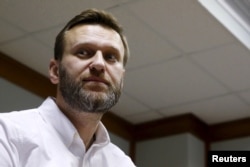The arrest of Russian Economic Development Minister Alexei Ulyukayev on Monday for allegedly accepting a large bribe has triggered speculation that hardliners at the top of Russia’s power hierarchy are moving against so-called system liberals in the government, including officials involved in formulating economic policy.
The Investigative Committee, Russia’s equivalent of the American FBI, claimed Ulyukayev had been caught red-handed receiving a $2 million bribe extorted from the state oil company Rosneft in return for supporting Rosneft’s acquisition of a controlling share in another oil firm, Bashneft.
Rosneft is headed by Igor Sechin, a longtime associate of President Vladimir Putin, widely seen as the second most powerful person in Russia.
Ulyukayev denied the extortion allegation, but Putin fired him Tuesday, and he has been placed under house arrest while awaiting trial.
Some observers believe Ulyukayev was set up.
"You would have to be insane, … both legally and politically, to threaten Rosneft in some way and to extort $2 million from Igor Ivanovich Sechin, who is actually one of the most influential people in our country,” Alexander Shokhin, a former deputy prime minister who now heads the Russian Union of Industrialists and Entrepreneurs, told the Business FM radio station.
Likewise, Alexei Navalny, the leading anti-corruption crusader and Putin critic, said his foundation had found evidence that Ulyukayev hid money in a bank account in Cyprus, but added that he did not “believe for a second” the allegation that Ulyukayev extorted a bribe from Rosneft.
On Wednesday, Russian law enforcement agencies searched the offices of Rusnano, the state nanotechnology corporation headed by Anatoly Chubais, architect of Russia’s controversial 1990s privatization program. While the search was carried out as part of a corruption case unrelated to Ulyukayev’s, some observers speculated it may have been part of a broader campaign targeting more liberal, Western-leaning officials.
In June, Nikita Belykh, the governor of Russia’s Kirov region who once headed a liberal political party, was arrested on bribery charges.
Andrei Kolesnikov, a senior associate at the Carnegie Moscow Center, told VOA’s Russian service that Ulyukayev’s arrest was a “classic in the genre of 1937” – the height of the “Great Terror,” Soviet dictator Josef Stalin’s purge of the then ruling Communist party.
“The security services obviously have carte blanche for the surveillance of almost all the elite, although the most intense blows are being inflicted on the liberal elite,” said Kolesnikov. “Since the arrest of Nikita Belykh, being under surveillance is becoming a trend. This is a very serious signal to all the elites that no one can feel safe, no matter what high position they hold.”
Some observers are asking whether hardliners in Russia’s security services may be acting on their own initiative – without getting a green light from the Russian president.
Andrei Soldatov, an expert on Russia’s security services and chief editor of the Agentura.ru website, thinks not. He told VOA there is no reason to think that Putin was presented with a “fait accompli” with Ulyukayev’s arrest.
In fact, Putin needs “targeted repression,” and the pretext for such actions are secondary, Soldatov said, adding that more such moves should be expected.
Some observers caution that while the corruption charges against Ulyukayev and other liberals may be politically motivated, it does not mean the accused officials are not corrupt.
“I don't think there is a single person in the Russian leadership who is not corrupt,” Vladislav Inozemtsev, an economist and member of the presidium of the Russian International Affairs Council, told VOA. “The very idea of corruption is so deeply rooted in the ‘power vertical’ that it is impossible to survive in this government without it, especially for a long time.
“It makes no difference whether a person is a liberal or a ‘silovik’ (a hardline security official): if someone is in the government and involved in the processes that have been going on there for the last 15 years, they are, for me, a potential criminal.”





